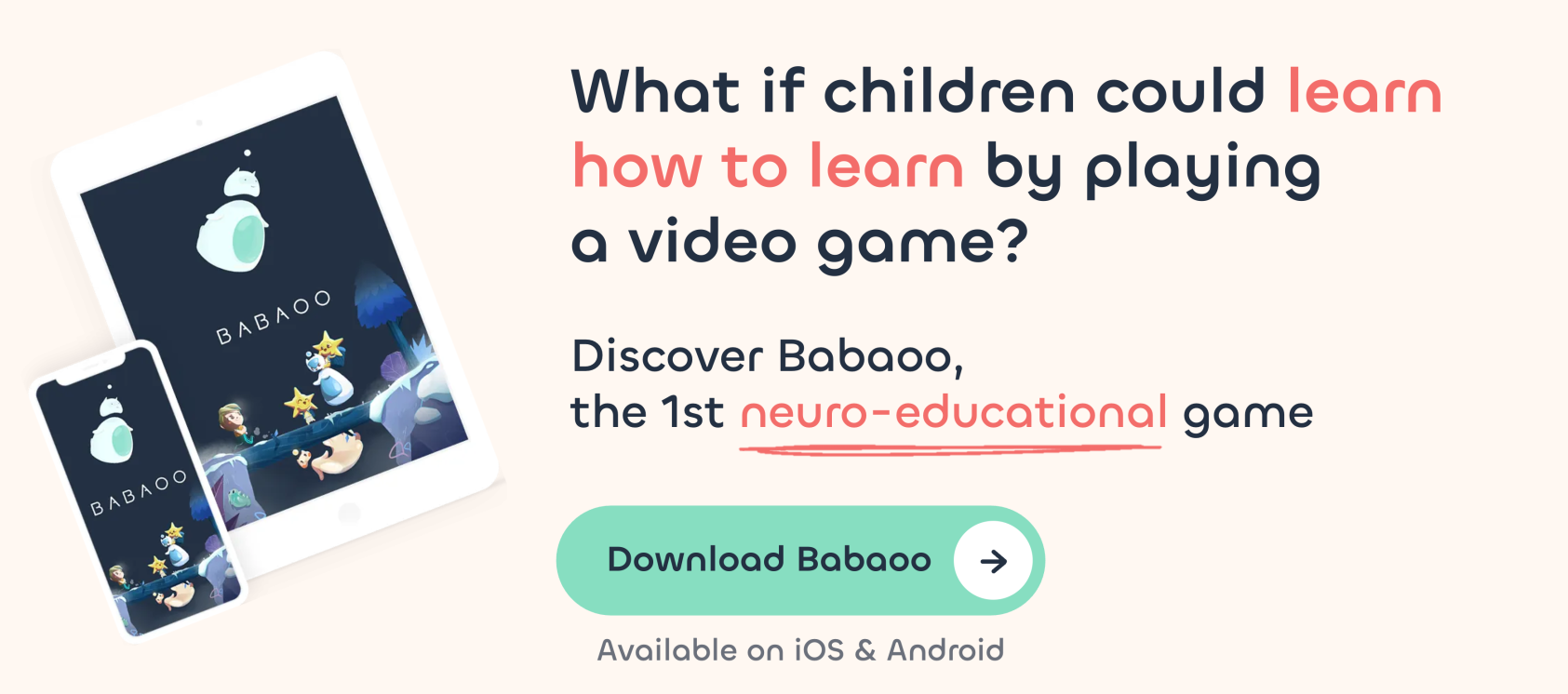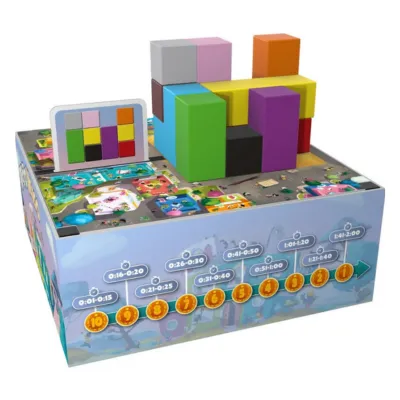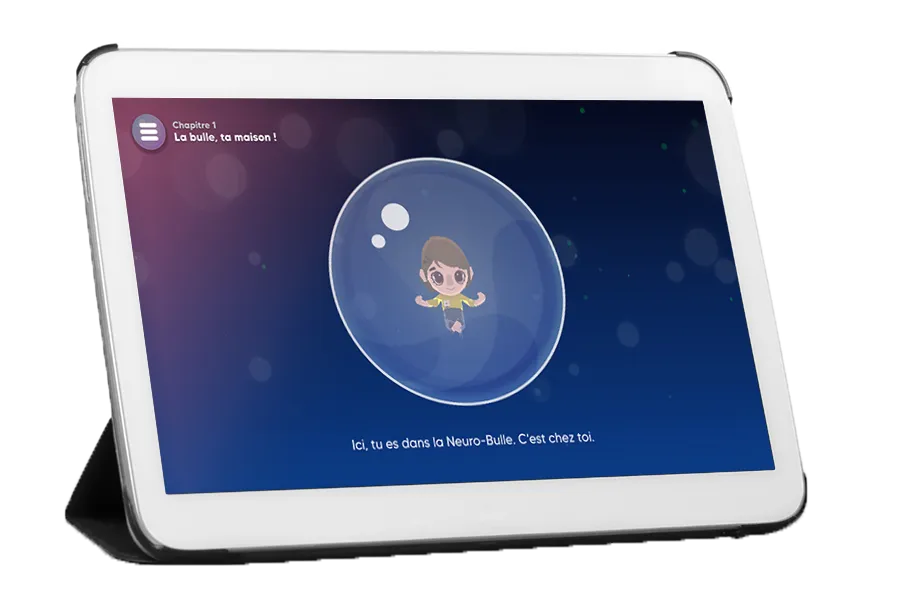In children, the development of Cognitive Functions is crucial, as it paves the way for successful learning and rich social interactions. Play is an effective way of fostering children’s cognitive development.
But how do we define Cognitive Functions? Why is their development so important in children? What role does play play in this process? And finally, which games should be chosen to encourage the development of children’s Cognitive Functions? Babaoo Mag has the answers! ⬇️
Cognitive Functions: what are they?
Cognitive Functions encompass various mental processes:
🧠 Memory
Memory represents the ability to encode, store and recall information. It includes short-term and long-term memory.
🎯 Executive Functions
Executive Functions enable us to concentrate on specific stimuli or tasks while ignoring distractions, to plan actions, but also to understand that several solutions may exist for the same situation.
👀 Perception
Perception refers to the process of interpreting sensory information to understand the environment.
💡 Problem solving and information processing
This refers to the Brain’s ability to process the vast amount of information it receives and find solutions to difficult or complex problems.
📢 Language
Language is the ability to understand and use oral and/or written communication.
Cognitive functions vs. executive functions: what are the differences?
It’s interesting to understand the differences between Cognitive Functions and Executive Functions to apprehend how our Brain manages the multitude of tasks it is confronted with.
🧠 Cognitive Functions
- They underlie all mental activities. These functions are involved in the basic operations of thinking, understanding, learning and memory. They encompass a wide range of mental processes involved in the acquisition, storage, manipulation and retrieval of information.
- Memory, Perception, Problem Solving, Language and… the Executive Functions are part of the Cognitive Functions.
- They are distributed in different regions of the brain.
🎯 Executive Functions
- They form a subset of Cognitive Functions. More specific, Executive Functions involve high-level processes required to regulate and manage other Cognitive Functions in order to obtain, “execute” goal-directed behavior.
- There are 5 main Executive Functions: Attention, Inhibitory Control, Working Memory, Cognitive Flexibility and Planning.
- Although the whole Brain is involved depending on the tasks performed, Executive Functions are mainly located in the prefrontal cortex, which develops throughout childhood and adolescence.
Developing Cognitive Functions in children: why is it important?
🎒 Academic success
Cognitive Functions are essential to academic success. Children with well-developed cognitive abilities understand and retain new information better, solve problems and think critically. These abilities are essential for performing well at school and making it through the stages of schooling.
💬 Social skills
Strong Cognitive Functions improve children’s ability to interact effectively with others. They can better understand social cues, communicate clearly and develop empathy, which is essential for establishing and maintaining healthy relationships. 😀
⚖️ Behavior regulation
Cognitive Functions play an important role in self-regulation. Children with good cognitive control can manage their impulses, stay focused on tasks and make thoughtful decisions. This ability to regulate behavior is essential for coping with the demands of everyday life.
💭 Long-term mental health
Early development of Cognitive Functions is also thought to be linked to better mental health. Children who develop strong cognitive skills are less likely to suffer from anxiety, depression and other mental health problems. They are also more resilient in the face of stress and difficulties.

The role of play in the development of Cognitive Functions
Much more than a leisure activity, play is an essential part of children’s development. In particular, it plays a crucial role in the development of Cognitive Functions. 🕹️
By engaging in playful activities, children stimulate various aspects of their cognition, such as Memory, Attention, Perception or Problem Solving. For example, memory and strategy games improve the ability to retain and manipulate information, while puzzles and construction games stimulate critical thinking and planning. Simulation activities and role-playing encourage the development of language, communication and social interaction.
In short, play is not just a source of entertainment, but a powerful educational tool that promotes the acquisition of cognitive skills essential to children’s overall development. 📈
Which games to choose to develop children’s Cognitive Functions?
Let’s take a look at which games are particularly effective in stimulating children’s Cognitive Functions!
Games to develop Memory
Games that involve rules, sequences or stories help to improve children’s memory. For example, memory association games or storytelling reinforce their ability to recall and process information.
Among the best-known games are undoubtedly “Memory”, which we all played as children, but also “The Magic Maze” and “The Mouse House”. Not all memory-building games can be found in stores. You can, for example, simply exercise your children’s memory (and yours, too) by playing at creating longer and longer lists, where each addition has to be repeated. “I’m going to the market and buying: apples, milk, bread, zucchinis, a notebook, a car…” The shopping list can get very long!
For older children, why not introduce them to other types of games, which often go hand in hand with general knowledge: crosswords, “Trivial Pursuit”.
The Mouse House
Function(s) emphasized : Memory, Attention
Age of players : 5 to 9 years old
Number of player(s) : 2 to 6 players
Principle:
When the cat’s away, the mice dance. Or rather, they have fun stealing objects from you and installing them in their mini-house. Will you be able to peek inside through the little windows and remember the different locations of the stolen objects? “Mouse House” is a great game for learning cooperation, which will further strengthen Cognitive Functions. So, which of you will have the most developed memory to remember all the objects that decorate the mice’s habitat?
The Magic Maze
Function(s) in focus: Memory, Attention
Age of players : 6 to 9 years old
Number of player(s) : 2 to 4 players
Principle:
Five objects have been placed in a Magic Labyrinth. Can you find them? Be careful, the walls move and you’ll have to memorize which passages to use and which to avoid. But who will find their way back first?
Games to develop Executive Functions
Play activities that require concentration, such as puzzles, board games and construction games, and speed games where impulsivity has to be managed, help children to develop their Executive Functions.
Some games stimulate the development of several Executive Functions, such as “Quickly” or “Bora Fruta”, while others focus more on one particular Executive Function. For example, for Attention, “Lynx” or “Dobble” is ideal, as are “Cherche & Trouve”books or Mandala coloring books. For Inhibition, games like “Uno” or “Jungle Speed” may be preferred. Dr. Maboul” and ‘Jenga’ work on the motor side of Inhibition.
“Rush Hour”, “Zip City” and “Le Labyrinthe” are all great ways to develop your children’s Planning skills, as are the games in the Smart Games collection, 3D Puzzles for older children, and “Jumpin” or “Snow White” for younger ones. Finally, there’s nothing quite like the classic “Little Bac” for exercising Flexibility, which involves finding words in several categories beginning with the same letter: for example, find an animal, a country, a city, a first name and a profession that begin with the letter E. The pooling of players’ lists is usually a lot of fun!
Quickly
Function(s) highlighted: Inhibition, Attention
Player age: 6 years and over
Number of player(s) : 2 to 5 players
Principle:
As its name suggests, “Quickly” is a game of speed, where you have to connect the right color to the right object as quickly as possible. This game, which requires a little thought and a lot of attention, has alternatives to appeal to older children.
“Cherche & Trouve” books
Function(s) emphasized : Attention, Flexibility
Age of players: 2 years and over
Number of player(s): 1 to 3 players
Principle :
Imagine a “Where’s Charlie” but adapted for children, with a multitude of themes available: Disney, Halloween, the farm, colors, emotions, pirates or space!
The Lynx
Feature(s) highlighted : Attention
Player age : 6 years and over
Number of player(s) : 1 to 6 players
Principle:
Let your child carefully observe the 400 images to find three illustrations among them. “Le Lynx” is a game with different levels of complexity, during which children and adults can have fun finding the different elements hidden on the board. A junior version for children aged 2 and over is also available.
Zip City
Function(s) emphasized: Inhibition, Attention, Planning, Flexibility
Player age : 8 years and over
Number of player(s) : 1 player
Principle:
Logic game in which one player must solve 40 increasingly complex challenges. This puzzle will require organization and Attention to succeed in getting the cars into the right paths, to avoid any risk of traffic jams!
Games to develop problem-solving skills and information processing
Play often involves challenges that require problem-solving. Activities such as building with LEGOs, puzzle solving or strategic games, such as “Stratego” and chess, encourage children to think critically and find solutions to problems.
Micro macro crime city, from age 10
Function(s) emphasized : Inhibition, Attention, Working Memory
Player age : 10 years and over
Number of player(s) : 1 to 4 players
Principle :
Let your children become little investigators who will try to lower Crime City’s crime rate. Between thefts, secrets and crimes, the police need help to keep an eye on the crooks and get to the bottom of delinquency! “Micro Macro Crime City” is a cooperative investigation game where little investigators can have fun solving the many misdemeanors taking place in Crime City.
Unlock
Function(s) emphasized: Inhibition, Flexibility
Player age : 10 years and over
Number of player(s) : 1 to 6 players
Principle:
Can your children solve the riddles before the time runs out? To do so, they’ll need to observe, analyze and combine their knowledge!
Games to encourage language development
By playing pretend or simply telling stories, children can exercise their language skills. Role-playing, in which they imitate adults or create imaginary scenarios, develops their vocabulary, narrative skills and ability to express themselves. Encourage your child to talk about anything and everything: his day, his gym class, his geography lesson! Charades, jokes and rhyming games are all different ways of inviting them to express and develop their language.
In terms of board games, once your child has started learning to write, “Scrabble” is ideal, as are “Taboo” and “Just One”. For older children, why not invite them to try their hand at word jumble?
Just One
Function(s) emphasized: Attention, Inhibition, Working Memory
Player age : 8 years and over
Number of player(s) : 3 to 7 players
Principle:
Find the best clue to make a player guess the mystery word! Be careful not to give the same clue twice. “Just One” is a vocabulary and general knowledge game that will appeal to children and adults alike!
Taboo
Function(s) highlighted: Inhibition, Attention, Working Memory
Player age : 13 years and over
Number of player(s) : 4 to 12 players
Principle:
Get players to guess as many words as possible in as little time as possible, without saying any forbidden words. “Taboo” is a game for young and old alike, that’s fun for the whole family!
Foster social interaction
Play often involves interaction with peers, which contributes to the development of social cognition. Children learn to share, wait their turn, negotiate and resolve conflicts – all important cognitive and social skills. While some games, such as “Recto verso”, “Code Names” or “Just One”, have all the qualities needed to encourage social interaction, there are also books on the subject that will stimulate debate, such as “Max et Lili”, a comic strip recounting the adventures of a brother and sister who bicker a lot, or “Silence, la violence”, by Sylvie Girardet, which will teach them how to react in the event of conflict with someone close to them.
Recto verso
Function(s) highlighted: Inhibition, Attention, Planning,
Age of players : 8 years and over
Number of player(s) : 2 to 6 players
Principle:
Two players must reproduce the same pattern, facing each other. They will have to discuss and join forces to succeed in representing their drawing. “Recto Verso” is a construction and speed game for children, ideal for game nights with friends or family!

Monster School (Placote)
Function(s) emphasized : Attention, Inhibition, Flexibility
Age of players : 3 to 6 years old
Number of player(s) : 2 to 4 players
Principle:
Little monsters must learn to behave themselves to succeed in their year at monster school! Teach them to understand which behaviors are appropriate and which are not, and find out who will graduate first. “L’école des Monstres” is a “Placote” game, a brand specializing in games dedicated to learning and in particular to the development of Executive Functions.
Babaoo: the educational video game that stimulates Executive Functions
Enhanced function(s): Inhibition, Attention, Working Memory, Flexibility, Planning
Player age : from 7 years old
Number of player(s) : 1 player
Principle:
Babaoo is unlike any other video game, as your child becomes a little adventurer exploring… his Brain! Since the arrival of the Distractors, the Brain’s inhabitants have been disrupted, and nothing works the way it used to. With the help of Inhi, his friend Babaoo, your child will have to discover the causes of the Great Distraction and help the inhabitants of the Brain-World regain control of their environment. An educational video game that teaches children to understand their Brain, so they can make better use of it!
The Babaoo recap
Cognitive Functions are essential mental processes that influence all aspects of a child’s development, from academic success to social interactions and overall mental health. The development of these functions from an early age lays the foundations for lifelong learning and well-being. Executive Functions are a subset of Cognitive Functions.
Play is a powerful tool in the process of developing Cognitive Functions, as it offers children the opportunity to improve their memory, Attention, problem-solving skills, language and social interactions in a natural and enjoyable way. Engaged in a playful activity, chances are they’ll come back for more, and won’t hesitate to start again, training their cognitive skills, game after game… without even realizing it!
By encouraging play, parents, educators and caregivers can make a significant contribution to children’s cognitive development. So… you know what you have to do? 1, 2, 3… Play!





